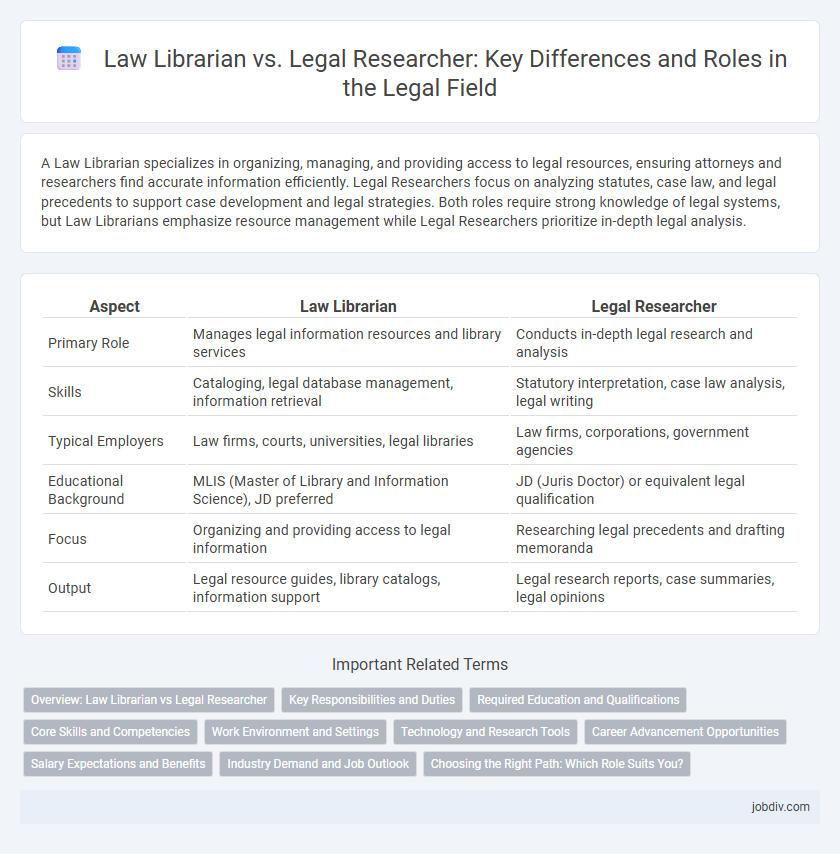A Law Librarian specializes in organizing, managing, and providing access to legal resources, ensuring attorneys and researchers find accurate information efficiently. Legal Researchers focus on analyzing statutes, case law, and legal precedents to support case development and legal strategies. Both roles require strong knowledge of legal systems, but Law Librarians emphasize resource management while Legal Researchers prioritize in-depth legal analysis.
Table of Comparison
| Aspect | Law Librarian | Legal Researcher |
|---|---|---|
| Primary Role | Manages legal information resources and library services | Conducts in-depth legal research and analysis |
| Skills | Cataloging, legal database management, information retrieval | Statutory interpretation, case law analysis, legal writing |
| Typical Employers | Law firms, courts, universities, legal libraries | Law firms, corporations, government agencies |
| Educational Background | MLIS (Master of Library and Information Science), JD preferred | JD (Juris Doctor) or equivalent legal qualification |
| Focus | Organizing and providing access to legal information | Researching legal precedents and drafting memoranda |
| Output | Legal resource guides, library catalogs, information support | Legal research reports, case summaries, legal opinions |
Overview: Law Librarian vs Legal Researcher
Law librarians specialize in organizing, managing, and providing access to legal resources within libraries or information centers, using expertise in legal information systems and cataloging. Legal researchers focus on analyzing statutes, case law, and legal precedents to support attorneys in developing legal strategies and preparing cases. Both roles require strong knowledge of legal databases and research methodologies, but law librarians primarily facilitate information access while legal researchers engage directly with substantive legal analysis.
Key Responsibilities and Duties
A Law Librarian manages legal resources, organizes collections of statutes, case law, and legal journals, and provides guidance on accessing legal information efficiently. A Legal Researcher conducts in-depth analysis of statutes, precedents, and legal documents to support case preparation and legal arguments for attorneys or firms. Both roles require expertise in legal databases, but the Law Librarian focuses on resource management, while the Legal Researcher prioritizes analytical and interpretive legal research.
Required Education and Qualifications
Law librarians typically require a Master of Library Science (MLS) degree with a specialization in law librarianship, often supplemented by a Juris Doctor (JD) for advanced expertise in legal materials. Legal researchers usually hold a JD degree, emphasizing skills in statutory analysis, case law research, and legal writing. Both professions prioritize strong analytical abilities and familiarity with legal databases, but law librarians focus more on information organization while legal researchers concentrate on case-specific legal problem-solving.
Core Skills and Competencies
Law librarians possess expertise in legal information management, including cataloging, classification, and maintaining comprehensive legal databases, enabling efficient access to statutory materials and case law. Legal researchers specialize in in-depth analysis of legal precedents, statutory interpretation, and synthesizing complex legal arguments to support case strategy and judicial decision-making. Both roles require proficiency in legal research tools such as Westlaw and LexisNexis, attention to detail, and strong critical thinking skills to ensure accuracy and relevancy in legal information retrieval.
Work Environment and Settings
Law librarians typically work in academic institutions, law firms, government agencies, and court libraries, providing access to legal resources and managing collections. Legal researchers are often employed within law firms, corporate legal departments, or government agencies, focusing on analyzing statutes, case law, and legal precedents to support litigation or policy development. The work environment for law librarians tends to be structured and resource-focused, while legal researchers engage in more analytical and investigative tasks, often under tight deadlines.
Technology and Research Tools
Law librarians utilize advanced legal databases like Westlaw, LexisNexis, and Bloomberg Law to manage and organize legal information efficiently. Legal researchers leverage sophisticated analytics platforms and AI-driven tools to conduct in-depth case law analysis, statutory interpretation, and legal trend prediction. Both roles integrate cutting-edge technologies to enhance the accuracy and accessibility of legal research outputs.
Career Advancement Opportunities
Law librarians often advance by specializing in legal information systems or becoming directors of law libraries, leveraging their expertise in managing extensive legal databases. Legal researchers typically progress by developing subject-matter expertise and securing positions as senior analysts or legal consultants within law firms or corporate legal departments. Both careers offer pathways to roles that require advanced knowledge of legal resources, but legal researchers may experience faster movement into advisory or strategic decision-making positions.
Salary Expectations and Benefits
Law Librarians typically earn a median salary ranging from $55,000 to $75,000 annually, often benefiting from healthcare, retirement plans, and paid leave due to their employment in academic or government institutions. Legal Researchers generally command higher salaries between $65,000 and $90,000, reflecting their specialized expertise in case law analysis and legal precedents, with benefits that may include performance bonuses and flexible work arrangements. Both roles offer opportunities for advancement, but Legal Researchers tend to have greater earning potential linked to private sector positions and contract-based work.
Industry Demand and Job Outlook
The demand for law librarians is steady, driven by law firms, academic institutions, and government agencies seeking expertise in legal information management and research resource curation. Legal researchers experience robust growth due to expanding needs for in-depth case analysis, statutory interpretation, and support in litigation firms and corporate legal departments. Job outlooks for both roles emphasize proficiency in digital legal databases and evolving technology, although legal researchers generally face higher growth rates linked to increasing litigation complexity and regulatory changes.
Choosing the Right Path: Which Role Suits You?
Law librarians specialize in organizing and managing legal resources, ensuring efficient access to statutes, case law, and regulatory materials, making them essential for law firms, courts, and academic institutions. Legal researchers focus on analyzing and interpreting legal information to support case strategies, drafting memoranda, and providing critical insights for attorneys and legal teams. Choosing the right path depends on your preference for resource management and information organization versus in-depth legal analysis and advisory roles.
Law Librarian vs Legal Researcher Infographic

 jobdiv.com
jobdiv.com